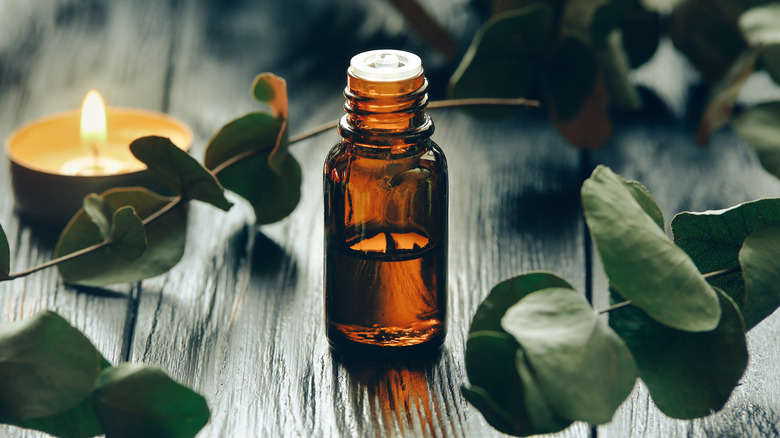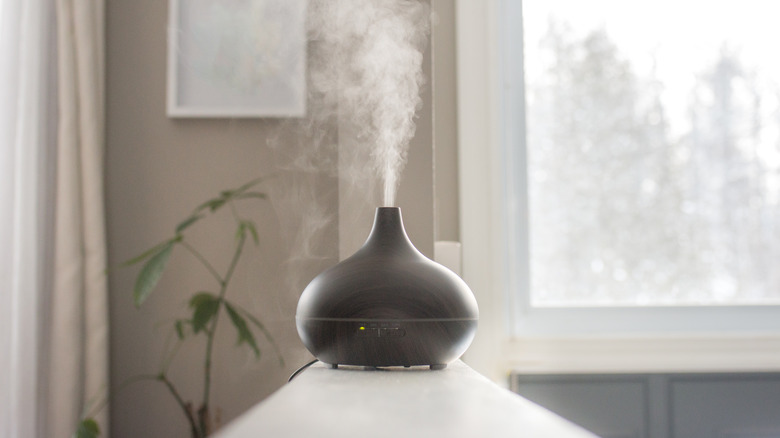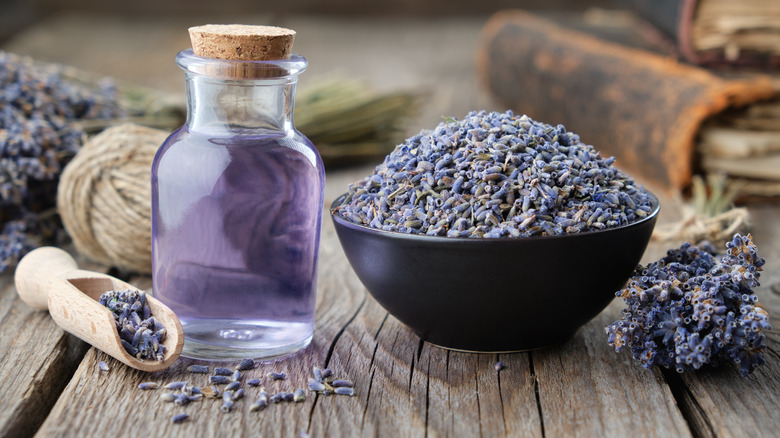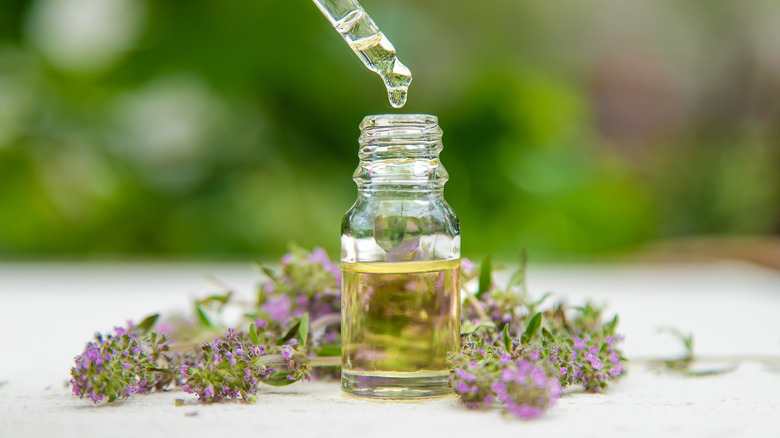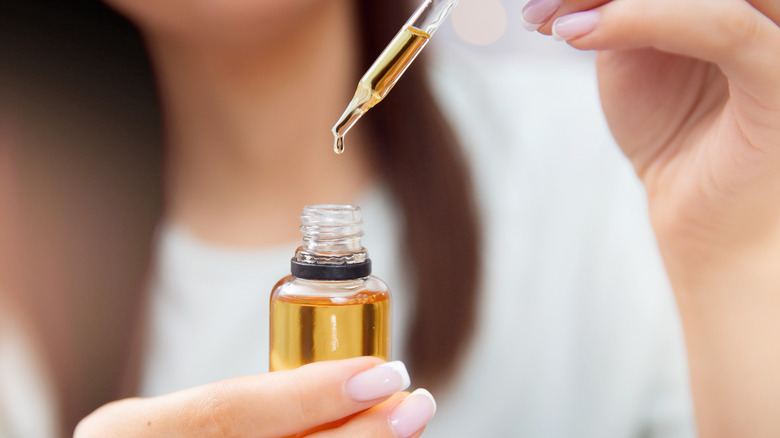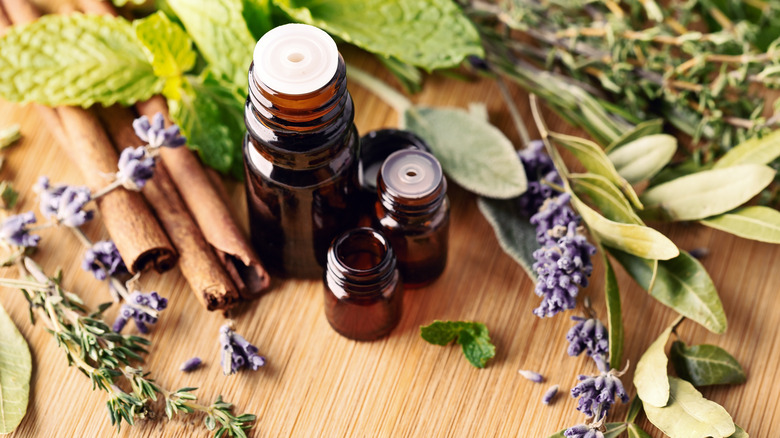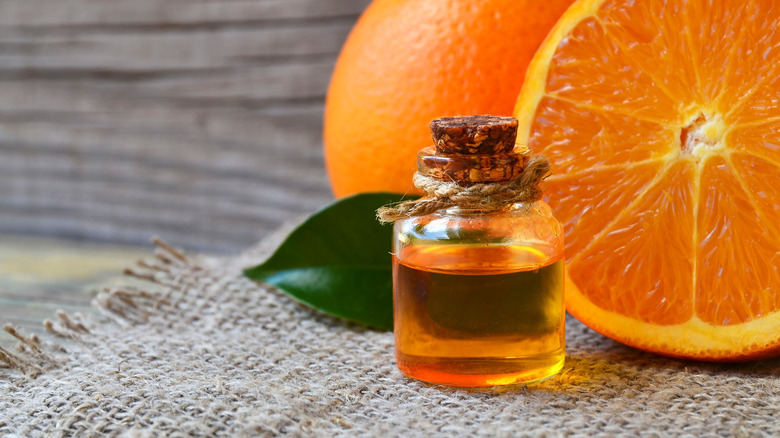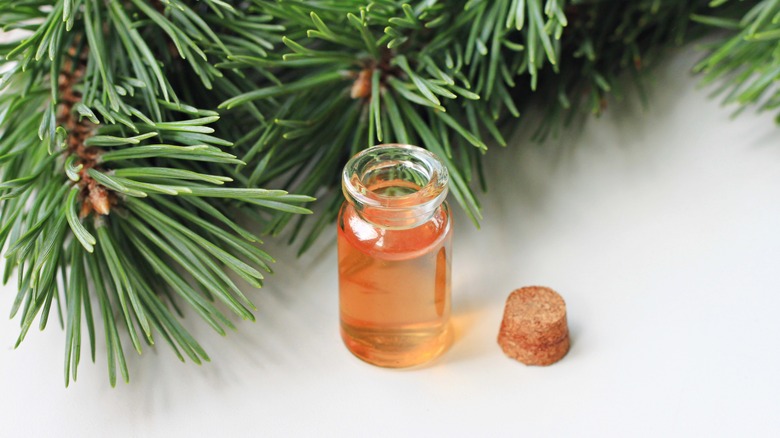These Essential Oils Are Awesome If You've Got Seasonal Allergies
Sneezing. Coughing. A stuffy or runny nose. Headaches. An itchy throat. The one thing these symptoms tend to have in common is being directly connected to seasonal allergies. Anyone who battles with these kinds of allergies knows that when pollen, dander, and mold are present in a concentrated amount, they can cause all kinds of physical discomfort (per Healthline).
There are over-the-counter medications and even prescriptions that your doctor can prescribe to help make the symptoms a bit more bearable. However, if you happen to be someone who prefers to use medicine as little as possible — or you're simply looking for an alternative for your allergies — did you know that certain essential oils can bring you some much needed relief, too?
Whether you decide to add a few drops of oil to a humidifier or a diffuser, apply some to your body during a steam shower, or give yourself a massage with a few drops (per Healthline), here are some essential oils that can help with seasonal allergies in pretty impressive ways.
Eucalyptus oil helps to ease congestion
Eucalyptus is an oil that contains numerous antimicrobial properties. This is important because antimicrobials ultimately help to kill off microorganisms like bacteria, fungi, and viruses. When you add this to the fact that this essential oil contains antibacterial compounds, it's no wonder that eucalyptus can help to bring relief to symptoms associated with the cold and flu. Eucalyptus can also help fight off bacteria that leads to tooth decay and help relieve lower back pain along with pain from arthritis and sprains, according to Medical News Today.
What makes eucalyptus helpful when it comes to treating seasonal allergies is that, not only can it help boost your immunity, but there's even science to support its use in decreasing inflammation, reducing bacteria, and suppressing some of the common reactions that accompany seasonal allergies (like a stuffy nose and congestion). So, as long as you like the scent of pine, when it comes to allergy relief, a dab or two of eucalyptus oil may be all you need.
Lemon oil suppresses bodily inflammation
If no matter what you do, you can't seem to get your energy levels up, adding a few drops of lemon oil to a diffuser (or even rubbing a drop or two onto your skin, via WebMD) might just be the pick-me-up that you need. According to Healthline, lemon has additional potential health benefits. If you're pregnant, it can help relieve morning sickness. If you're anxious, it can help calm your nerves. If you've got a sore throat that's associated with having a cold, lemon oil can help soothe it. Lemon even can help treat acne and promote clear skin.
What makes lemon oil so remarkable, allergy-wise, is its potency in reducing inflammation. Some studies say that this citrus oil can decrease inflammation that may occur from allergies and that it even helps suppress the allergic responses you may have altogether. How cool is that?
Frankincense oil boosts immunity
The earthy scent of frankincense is one that typically isn't thought of often except for around the holiday season. Still, regular essential oil users know that it has a number of health benefits apart from its sweet earthy scent. Dr. Axe shares that frankincense offers great support when it comes to reducing stress levels, slowing down the signs of aging in skin, boosting fertility, improving one's memory, and easing digestion.
Frankincense is also a top oil for treating seasonal allergies for a myriad of reasons. Its antiseptic and disinfectant properties help to kill bacteria and germs that can weaken your immune system. It's also a powerful sleep aid and another oil known for its ability to reduce bodily inflammation.
Something else to keep in mind about frankincense oil is that — if you have asthma — its natural properties can help prevent your throat muscles from swelling up (per WebMD). This is certainly good to know if your asthma symptoms tend to be triggered whenever pollen counts are high in your environment.
Lavender oil improves quality of sleep for people with allergies
Hands down, one of the most popular essential oils is lavender. Its soft floral scent has a reputation for encouraging calmness and relaxation, but what you may not know is its other multitude of health benefits. Verywell Mind shares that lavender oil contains anti-inflammatory, antifungal, antidepressant, antiseptic, antibacterial, and antimicrobial properties that work together to relieve anxiety (in fact, lavender is just one of many oils for anxiety). Medical News Today reveals that it helps treat fungal infections and hair loss and that it can even lessen the severity of symptoms associated with premenstrual syndrome (PMS).
But why is lavender oil so great at treating seasonal allergies? For one thing, it's really helpful in reducing inflammation and mucus that may have built up in your system. Also, if something you hate most about allergy season is the lack of sleep you seem to get, lavender can help calm your nervous system so you're able to fall asleep faster and stay asleep longer.
Thyme oil helps to soothe coughs
Thyme is an herb that is also available as an essential oil. Although it doesn't get as much attention as a lot of other oils, this doesn't make it any less beneficial. It's actually considered to have medicinal properties that help to lower blood pressure, treat yeast infections, uplift mood, and help in potentially preventing certain forms of cancer (per Healthline).
You should give thyme a try if you struggle with seasonal allergies, as it's been hailed as a natural cough remedy. It's also packed with vitamins A and C, along with iron and manganese, as Healthline noted, to boost your immune system and fight various kinds of bacteria.
In fact, if your seasonal allergies are prone to trigger a form of bronchitis every year, mixing thyme with ivy leaves can provide quite a bit of relief to your throat and ultimately suppress your cough, according to published studies.
Sandalwood oil is an all-natural expectorant
Similar to frankincense oil, sandalwood is an essential oil that offers a somewhat sweet and woodsy fragrance. Since it's the kind of oil that contains antiseptic, anti-inflammatory, and astringent properties, it makes total sense that Organic Facts would hail it as a helpful treatment for acne and skin conditions like eczema and psoriasis. Dr. Axe is a fan of the oil, because it provides a calming effect, can boost your libido, and may bring relief to urinary tract infections (UTIs).
What Dr. Axe also likes about this oil is that it's a natural expectorant. In other words, sandalwood oil has the ability to loosen up mucus in your system so it's easier to cough it up. Add to this the fact that it also works as a sedative — applying sandalwood oil a couple of hours before turning in may be just the seasonal allergy remedy you've been looking for.
Clary sage oil contains potent antibacterial and anti-inflammatory properties
Clary sage is the kind of oil that every household should have — that's how holistically helpful it is. Organic Facts shares that it's an essential herb (in oil form) that contains astringent, sedative, bactericidal, antidepressant, and even euphoric properties. Using this oil on a consistent basis can help relieve depression-related symptoms, improve the quality of your skin, prevent hair loss, fight oral decay, regulate menstrual cycles, and lower blood pressure.
This is a surefire oil for dealing with seasonal allergies because clary sage is known to reduce inflammation. Also, since bacteria oftentimes plays a pivotal role in increasing inflammation in people who struggle with allergies, the powerful antibacterial compounds in clary sage can help to keep symptoms from intensifying.
If you do decide to make clary sage a part of your seasonal allergy regimen, make sure to run it by your doctor if you have low blood pressure. This is because some studies reveal that it can cause unpleasant side effects for individuals who do.
Rosemary oil has antioxidants that fight allergy-related symptoms
You can never go wrong with having a bottle of rosemary essential oil in your bathroom cabinet. From a physical health perspective, it helps to improve cognitive function, reduce the sensation of pain, improve blood circulation, decrease stress, and boost energy levels (per Healthline). From a beauty angle, rosemary oil is awesome because, thanks to its powerful antioxidants, it helps to strengthen hair and slow the signs of aging in your skin, too, as noted by Byrdie.
What makes this oil so remarkable for treating seasonal allergies is that its antioxidants help to reduce bodily inflammation in such a way that it can potentially stop allergy symptoms before they even start.
Another great thing about rosemary oil is its ability to lower cortisol levels, which means you'll feel less stressed. And the less stressed you feel, the easier it will be to relax and get the rest you need to combat seasonal allergies — which is always a good thing.
Chamomile oil relieves hay fever-related symptoms
It wouldn't be surprising that, when you hear the word "chamomile," the first thing that comes to mind is tea. Chamomile does, however, come in the form of an essential oil that has all kinds of potential health benefits.
Thanks to the properties inherent to this flowering plant, chamomile oil can encourage sweating (which can eliminate toxins from your system), fight off infections, improve digestion, relieve pain, and even soften the appearance of scars over time. As far as your mental health goes, some research associates this particular oil with its potential ability to decrease symptoms of depression and even reduce anger (via Organic Facts).
You may want to give chamomile oil a try as far as seasonal allergies go. Dr. Axe shares that the oil's antimicrobial and antioxidant properties are known for relieving the congestion and swelling commonly associated with hay fever. This is especially great news since hay fever is triggered by pollen, as noted by the Mayo Clinic.
Sweet orange oil decreases inflammation
Sweet orange oil smells pretty much the way it sounds, and, if you've ever peeled a fresh orange before, you know that the scent is pleasantly invigorating. So it makes total sense that orange is associated with many fragrances, lotions, and hair products.
When it comes to its potential health benefits, Organic Facts shares that sweet orange oil has potent anti-inflammatory, astringent, and even antidepressant properties. It's the kind of oil that helps to increase energy levels, boost sex drive, and even regulate your menstrual cycle. And it can even help to increase lactation if you're a new mom.
As you've probably already noticed, inflammation is a prominent symptom of seasonal allergies. Well, sweet orange oil is another oil that has the ability to reduce inflammation, helping you to breathe easier and feel better while dealing with an excess of pollen at various times throughout the year.
Balsam fir oil improves respiratory function
Balsam fir may not be one of the most common types of essential oils, but it's pretty effective. Balsam fir is a type of fir oil that is beneficial on a few different levels. According to Dr. Axe, this essential oil is made up of compounds that help to fight fatigue, strengthen bones, decrease pain, soothe muscular discomfort, and lessen body odor.
As far as seasonal allergies go, balsam fir oil can work all kinds of magic. Its antibacterial and antimicrobial properties work together to help prevent infections, strengthen respiratory function, and soothe sinusitis. This is beneficial because the last thing you need is a sinus infection when you're already dealing with seasonal allergies.
So, if you happen to feel a lot of sinus pressure, you've got a killer headache, or you've got nonstop congestion or a cough, breathe in some balsam fir essential oil. It just may be the all-natural remedy you've been looking for (per Dr. Axe).
Tea tree oil reduces sinus tissue inflammation
Tea tree oil is one of the most powerful essential oils on the market. Its super potent antibacterial, antioxidant, and antifungal properties make it an effective ingredient for hand sanitizer, deodorant, and mouthwash. Additionally, tea tree is great for clearing up your skin, removing nail fungus or dandruff, and repelling insects (per Healthline). Tea tree oil helps relieve seasonal allergy symptoms because the compounds within help to reduce sinus tissue inflammation and bacteria, making it easier to breathe through your nose.
Before you use tea tree oil, however, we have a few recommendations to help keep you healthy and safe. Never swallow tea tree oil or apply it directly to your skin (as it can cause a burning sensation), and avoid administering it to your pets. For topical use to your skin, make sure to dilute the oil with something like fractionated coconut oil (per Healthline). If you're using it as a mouthwash, make sure to spit the oil out, and keep it out of reach from pets and small children, as Healthline notes. If you're careful, though, tea tree oil can help get you through allergy season — and more.

